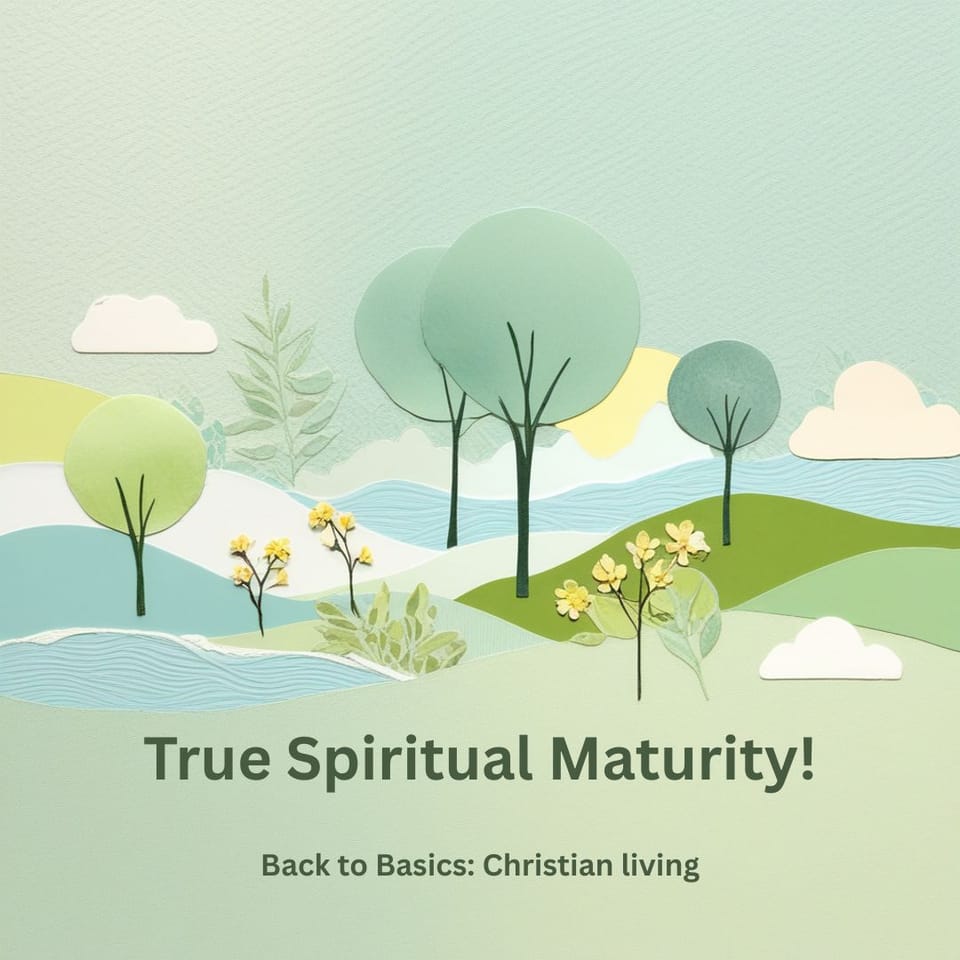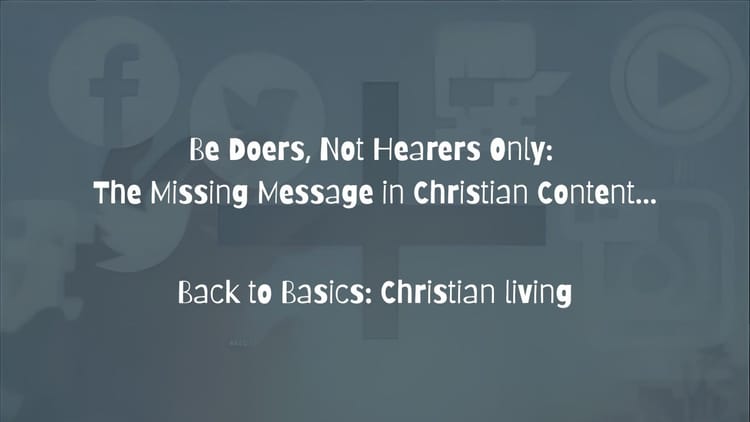True Spiritual Maturity!

Living What We Know: The True Measure of Spiritual Maturity!
In our modern Christian landscape, we find ourselves surrounded by unprecedented access to biblical knowledge. Podcasts, books, online sermons, conferences, and Bible studies offer endless opportunities to accumulate spiritual information. Yet, amidst this wealth of resources, a profound question emerges: Are we merely collecting knowledge, or are we allowing it to transform our lives?
The Scriptures speak directly to this dilemma through James's piercing words: "But be ye doers of the word, and not hearers only, deceiving your own selves" (James 1:22 KJV). James continues with a powerful metaphor that resonates deeply with our information-saturated culture: "For if any be a hearer of the word, and not a doer, he is like unto a man beholding his natural face in a glass: For he beholdeth himself, and goeth his way, and straightway forgetteth what manner of man he was" (James 1:23-24 KJV).
This spiritual amnesia afflicts many believers today. We listen attentively to powerful sermons, highlight passages in our Bibles, and nod in agreement with profound theological truths—only to walk away unchanged. We look into the mirror of God's Word, see our reflection clearly for a moment, then promptly forget what we've seen as we return to our daily routines.
Our Lord Jesus Christ emphasized this principle in His teachings. In the Sermon on the Mount, He declared: "Therefore whosoever heareth these sayings of mine, and doeth them, I will liken him unto a wise man, which built his house upon a rock: And the rain descended, and the floods came, and the winds blew, and beat upon that house; and it fell not: for it was founded upon a rock" (Matthew 7:24-25 KJV). The foundation of our spiritual life isn't built on what we know intellectually, but on how faithfully we apply what we know.
The Apostle Paul offers further insight into this disconnect between knowledge and application: "Knowledge puffeth up, but charity edifieth" (1 Corinthians 8:1 KJV). When our spiritual knowledge remains detached from loving action, it doesn't lead to transformation—instead, it can become a source of pride and self-deception.
We see this warning illustrated throughout Scripture. Jesus delivered some of His strongest rebukes to the religious leaders of His day who possessed vast theological knowledge but failed to embody the truths they taught: "Woe unto you, scribes and Pharisees, hypocrites! for ye pay tithe of mint and anise and cummin, and have omitted the weightier matters of the law, judgment, mercy, and faith: these ought ye to have done, and not to leave the other undone" (Matthew 23:23 KJV).
So what does genuine spiritual maturity look like? It's when our knowledge transforms both our character and conduct. The Apostle Peter provides a beautiful progression of spiritual growth: "And beside this, giving all diligence, add to your faith virtue; and to virtue knowledge; And to knowledge temperance; and to temperance patience; and to patience godliness; And to godliness brotherly kindness; and to brotherly kindness charity. For if these things be in you, and abound, they make you that ye shall neither be barren nor unfruitful in the knowledge of our Lord Jesus Christ" (2 Peter 1:5-8 KJV).
The early church exemplified this lived-out faith. After Pentecost, the believers "continued stedfastly in the apostles' doctrine and fellowship, and in breaking of bread, and in prayers" (Acts 2:42 KJV). Their learning immediately translated into living—in community, worship, and prayer. Their knowledge wasn't merely intellectual; it shaped their daily practices and relationships.
How, then, do we cultivate this integrated faith in our own lives? Three practical approaches can help bridge the gap between knowing and doing:
1. Approach Scripture with intent to obey
When we open God's Word, our aim shouldn't be merely to learn but to be transformed. Jesus promised, "If ye know these things, happy are ye if ye do them" (John 13:17 KJV). Try praying before reading: "Lord, show me not just what this means, but how I should live differently because of it." The Psalmist modelled this approach when he prayed, "Teach me, O LORD, the way of thy statutes; and I shall keep it unto the end" (Psalm 119:33 KJV).
2. Practice immediate application
When God reveals truth to us, we must resist the temptation to file it away for future reference. Instead, we should look for ways to put it into practice immediately. Whether it's extending forgiveness, practicing generosity, or speaking encouragement, prompt obedience cultivates spiritual growth. As Solomon wisely advised, "Whatsoever thy hand findeth to do, do it with thy might" (Ecclesiastes 9:10 KJV).
3. Invite accountability
We need others who can ask the hard questions and hold us accountable to living out what we know. The writer of Hebrews instructs, "But exhort one another daily, while it is called To day; lest any of you be hardened through the deceitfulness of sin" (Hebrews 3:13 KJV). Solomon likewise observed, "Iron sharpeneth iron; so a man sharpeneth the countenance of his friend" (Proverbs 27:17 KJV).
The most compelling testimony isn't from those who can quote Scripture or explain complex theology—it's from those whose lives have been visibly transformed by applying God's truth. The parent demonstrating patience because they've internalized God's patience with them. The employee working with integrity when no one is watching because they understand they ultimately serve the Lord. The believer responding to criticism with grace because they've embraced Christ's example of forgiveness.
As an ancient proverb suggests, "People may doubt what you say, but they will always believe what you do." Our lives speak volumes more than our words. The Apostle John puts it plainly: "My little children, let us not love in word, neither in tongue; but in deed and in truth" (1 John 3:18 KJV).
Let us therefore aspire to be known not merely for what we know, but for how faithfully we live what we know—for that is the true measure of spiritual maturity. As we face the challenges of our day, may we heed the exhortation of James: "But whoso looketh into the perfect law of liberty, and continueth therein, he being not a forgetful hearer, but a doer of the work, this man shall be blessed in his deed" (James 1:25 KJV).
What truth has God revealed to you recently that awaits application? Take a moment to reflect, and then commit to one specific action this week. For "to him that knoweth to do good, and doeth it not, to him it is sin" (James 4:17 KJV).
Key Takeaways:
- True spiritual maturity is measured by application, not merely knowledge: It's about living out what we know, not just accumulating biblical information.
- Scripture warns against being hearers only: James 1:22 KJV cautions against the self-deception of knowing without doing.
- Knowledge without application leads to spiritual amnesia: We look in the mirror of God's Word but quickly forget what we've seen.
- Christ emphasised obedience as the foundation: Building our spiritual house on rock means putting His teachings into practice (Matthew 7:24-25 KJV).
- Knowledge alone can lead to pride: As Paul warns, knowledge without love merely "puffeth up" (1 Corinthians 8:1 KJV).
- Three practical approaches to bridge the knowing-doing gap: Approach Scripture with intent to obey, practice immediate application, and invite accountability.
- Our actions speak louder than our words: The most compelling Christian testimony comes through transformed living, not theological knowledge.





